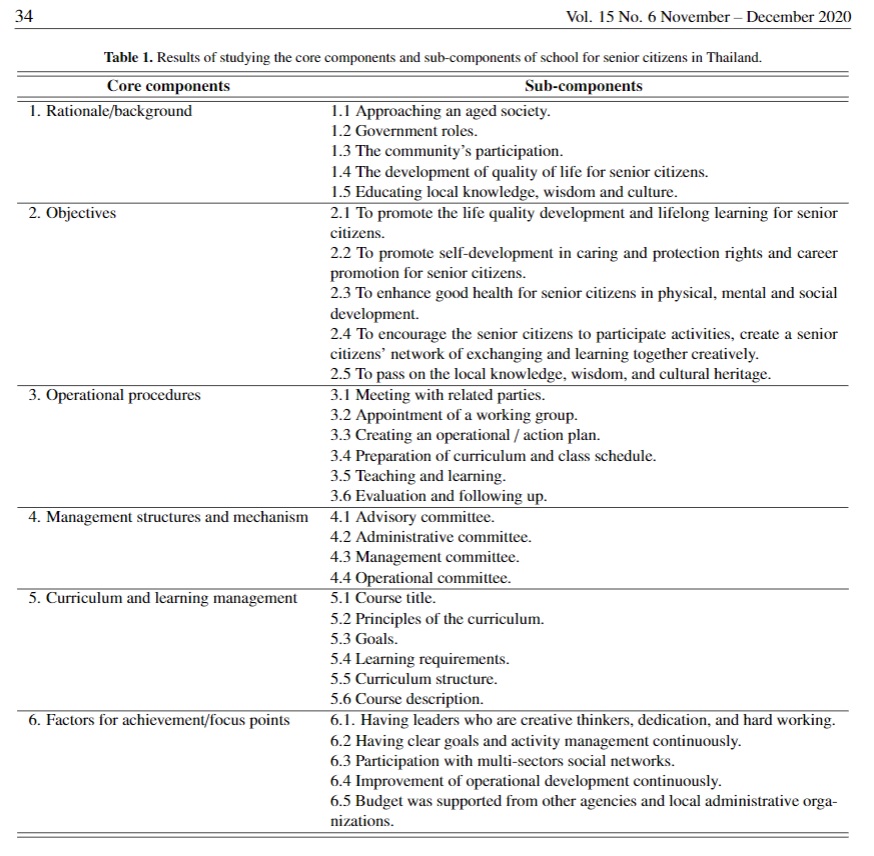Development of management model for senior citizens school under Chiang Mai City municipality towards Thailand 4.0
Main Article Content
Abstract
This research aimed to 1) to study and synthesize the management components of school for senior citizens in Thailand, 2) to investigate the feasibility and guidelines for the management of school for senior citizen schools under Chiang Mai city municipality towards Thailand 4.0, 3) to develop and verify a pre-model of school management for senior citizens under Chiang Mai city municipality towards Thailand 4.0. Instruments used in this research were a component synthesis, an open-ended question, and a 5 rating-scale questionnaire. Data were analyzed by percentage, mean, standard deviation, content analysis, and descriptive analysis. Results of the research were found as follows: 1. Results of studying and synthesizing the management components in step 1 consisted of 6 components and 31 sub-components, step 2 consisted of 6 components and 39 sub-components. 2. The investigation results of the feasibility and guidelines consisted of 6 components and 36 sub-components. 3. Results of developing a pre-model for senior citizen schools under Chiang Mai city municipality towards Thailand 4.0 was named ROO(pdca)MCF model, consisting of 6 components and 36 sub-components and verifying the management model in section 1, the correction was average at 99.38 percent and the suitability was average at 95.99 percent, in section 2 was concerning the evaluation results, the possibility and the utility were at the highest level.
Article Details

This work is licensed under a Creative Commons Attribution-NonCommercial-NoDerivatives 4.0 International License.
References
S. Aungkana, New perspective of elderly care in Thailand 4.0 era: Roles of nursing administrations, Journal of The Royal Thai Army Nurses 19(2) (2018).
D. Churairat, T. Sathapon, S. Achara, Outcomes and sustainability of community participation in elderly health promotion,Interdisciplinary Research Review 11(3) (2016) 54 - 61.
R. Archanya, Proposal for operational improvement regarding senior citizen's potential enhancement, Silpakorn Education Research Journal 11(1) (2019).
The National Committee on the Elderly, The Ministry of Social Development and Human Security, Thailand, The 2nd. National Plan on the Elderly 2002-2021, 1st. http://www.dop.go.th/download/laws/law_th_20161107091458_1.pdf (accessed 20 July 2019)
S. Linda, H. Jeff, Technology for seniors and the elderly. https://www.seniorliving.org/tech (accessed 20 July 2019)
B. Kampanad, A. Sayam, L. Meena, M. Orapun, K. Shantibala, Indicators of active ageing for sustainable development: A comparative insights of ageing elderlies from Chiang Mai (highland) and Nakhon Pathom (lowland) Provinces, Thailand, Interdisciplinary Research Review 14(5) (2019) 39 -- 46.
S. Kyu-taik, Elder respect among young adults: A cross-cultural study of Americans and Koreans, Journal of Aging Studies, 18(2) (2004) 215 -- 230.


